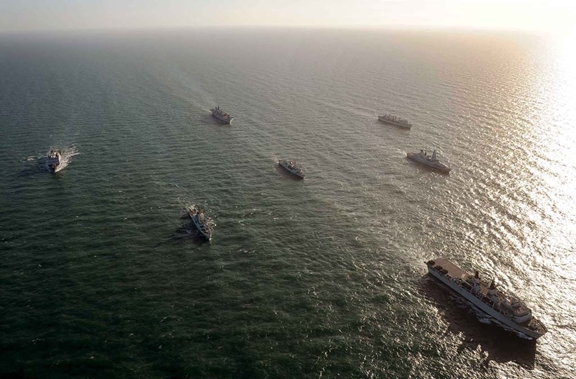
Exercise Joint Warrior 2013 is certainly Europe’s, and possibly the world’s biggest maritime amphibious military exercise this year, and I am having the pleasure to observe and be sea-sick all over it.
Led by the Royal Navy and 3 Commando Brigade, the exercise involves some forty ships from fifteen nations with over forty thousand personnel as part of a Response Force Task Group (RFTG) designed in military-speak for ‘theatre entry’ from the sea.
This is Britain’s global reach maritime amphibious spear-tip which will soon be strengthened immeasurably with the commissioning of the two aircraft carriers HMS Queen Elizabeth and HMS Prince of Wales. The force affords London reach, flexibility, and political discretion during crises that only the Americans can match.
What key lessons have I learnt from the exercise, not just for the British but all Western states grappling with defense strategy, austerity, and affordability?
Core Message: Britain’s 2015 Strategic Security and Defence Review (SDSR) will fail unless London properly balances ambition, resources, and commitments. To that end the defense review must look upward and outward at the world and down and dirty into the services to drive efficiencies. Above all it must have the ambition to answer the seminal question at the very heart of Britain’s strategic defense dilemma: what role does Britain seek to play in the world, why, and with whom?
- The People Lessons: The quality of personnel is quite simply outstanding. Indeed, for all the impressive capability of the ships and aircraft on display it is the people that are the real spear-tip. Sadly, too many British personnel to whom I speak often with many years outstanding service tell me they will soon leave because changing tax and pension rules effectively make it impossible for them to stay beyond forty.
- The ‘Harmony’ Lessons: The Royal Navy ‘harmony’ rule is that personnel must be on duty 220 days deployed per annum, the Army 166, and the RAF 140 even though all three services are in harm’s way in Afghanistan. On the face of it this apparent imbalance undermines the ability of Britain’s armed forces to deliver the same with less through deeper synergies.
- The Leadership and Command Lessons: The endemic tribalism at the higher levels of all three services must be ended. Indeed, tribalism is doing real damage to the case for national investment in the armed forces. The British military will need to radically rethink the way it does business across the security and defense piece. Britain’s military leaders must demonstrate to both their political masters and the taxpayer they understand that. Critically, no single service will be able to ‘own’ the five domains of twenty-first century military effectiveness – land, sea, air, cyber, and space. The new Joint Force Command (JFC) is a start but it goes nowhere far enough and at the very least must have high-level representation from all three services. A first step would be for the service chiefs to properly support the Joint Expeditionary Force with the RFTG as its realization.
- Lessons for the Defence Review: The 2010 SDSR was what one senior figure called a “spreadsheet review,” where balancing the books came well before a coherent military capability. While those involved understood this requirement and accepted capability “holidays” there was apparently very little linkage between cost-cutting and the “faux strategy” trumpeted by government. While the British government was essentially correct to close a 2010 funding gap of some 38 billionpounds the 2010 defense review signally failed to align resources and commitments.
Next Steps: It is critical that London remains the alternative (to the Americans) coalition force generator and leader of choice as this buys London influence in both capitals and institutions far beyond the simply military domain. However, London’s systemic short-termism is undermining Britain’s ability to influence key allies and institutions, not least Washington. This is not just important for the British but also for NATO and the EU. One Dutch officer admitted to me that neither the Royal Netherlands Navy nor the Royal Netherlands Marine Corps would exist but for their British counterparts.
The Royal Navy’s motto is if you want peace, prepare for war. Thankfully, Britain today does not have to prepare for war. However, in a world full of friction if Britain is to help prevent conflict injurious to its national interests it must think and act strategically. Therefore, SDSR 2015 must finally look beyond Afghanistan and not simply re-fight it better. Indeed, the switch from so-called campaigning to contingency operations will make the 2015 review as close to a grand strategic year zero as Britain has known for a century. It is an opportunity to be seized not squandered.
Let me conclude by thanking the Commodore commanding the exercise together with his staff. My sincere thanks are also offered to the captains and crews of respectively HMS Bulwark, HNLMS Rotterdam and HMS Westminster and 3 Commando Brigade, for their kind hospitality and for clearing up after me.
Julian Lindley-French is a member of the Atlantic Council’s Strategic Advisory Group. This essay first appeared on his personal blog, Lindley-French’s Blog Blast.
Photo credit: Royal Navy
Image: 5b55648e3a744c56afe3738a3304b697-576x0.jpg
